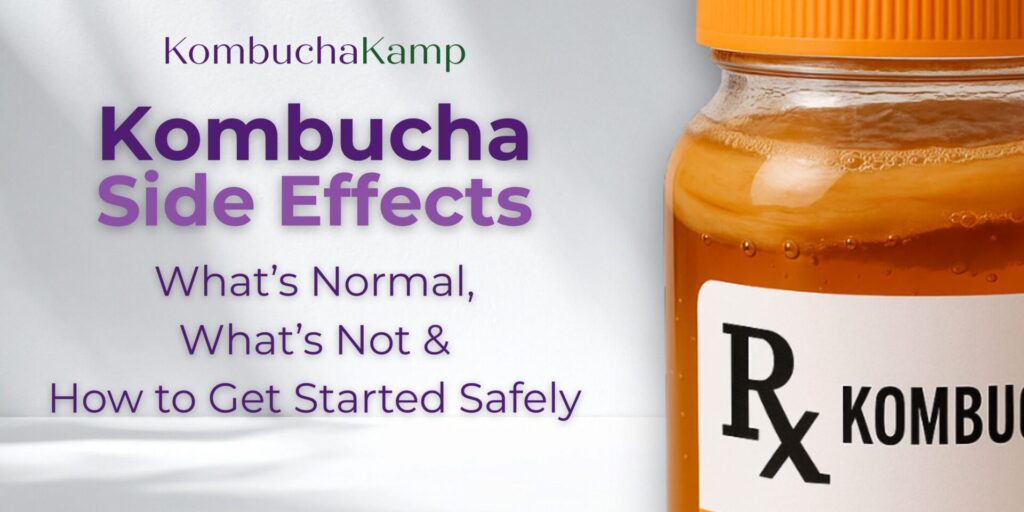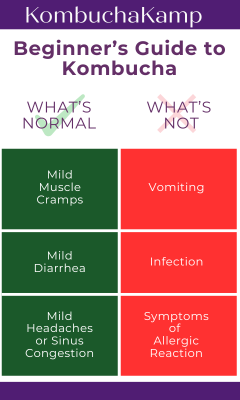Are you a Microbe Master? Take Our 8-Question Quiz and Start Brewing Today!


(This information is educational only and based on Kombucha Kamp’s decades of brewing experience, not a substitute for medical advice. Always consult your doctor before any diet or nutrition change.)
If you’re new to drinking Kombucha, you might notice some temporary side effects — and that’s completely normal. In fact, many people begin to include Kombucha, Kefir, and other fermented foods as a way to address numerous underlying health issues that have shown clinical benefit through the introduction of the amino acids and healthy microbes that fermented foods naturally produce and contain. Studies have shown that even people with Type 2 Diabetes may benefit from improved fasting blood sugar when they begin regularly consuming Kombucha! (Ref: https://pmc.ncbi.nlm.nih.gov/articles/PMC10426908/)
Because most modern diets – especially the Standard American Diet (S.A.D.) – lack fermented foods and probiotic diversity, suddenly introducing millions of beneficial microorganisms can spark a short-term “cleansing” response in the body.
At Kombucha Kamp, we’ve helped tens of thousands of homebrewers make safe, healthy booch. While a few experience mild discomfort at first, nearly everyone reports greater energy, improved digestion, and clearer skin over time. The key is understanding what’s happening inside your body — and how to ease through it.
Many people confuse Kombucha’s detox symptoms with an allergy or adverse reaction. In reality, true allergies to Kombucha are rare (unless you’re allergic to tea).
More often, what’s happening is known as a Healing Crisis, or Herxheimer Reaction — a temporary period where your body is working hard to eliminate built-up toxins. Think of Kombucha as a gentle catalyst… It introduces beneficial acids, enzymes, and probiotics that help your liver and gut flush out stored waste from food, alcohol, pollution, or stress.
When that debris enters the bloodstream for removal, you may briefly feel worse before you feel better — the same “gets worse before it gets better” process recognized in many holistic detox therapies.
During this short period, you might experience one or more of the following as your system rebalances:
These sensations are typically short-lived, lasting anywhere from a few hours to a few days. They are signs of your body releasing waste — not of harm from the Kombucha itself. Just as with most healthy lifestyle changes, they take a bit of time and solid consistency before their full benefits can be realized.
If symptoms feel intense, simply cut your intake in half until your body catches up — don’t stop completely unless discomfort is severe.
While mild detox reactions are normal, consult your healthcare provider if you experience:
These are very rare, but safety always comes first.
The Herxheimer Reaction isn’t unique to Kombucha — it can occur with any powerful probiotic or natural therapy that mobilizes toxins. The difference is that Kombucha not only stimulates detox but actively supports liver function, helping the body process waste efficiently.
That’s why, for many drinkers, Kombucha becomes part of the solution: it helps balance gut flora, rebuilds digestive resilience, and minimizes future reactions.
Adapted from holistic resources such as The Natural Path and Shirley’s Wellness Café:
“The more toxins there are to eliminate, the sicker one is when they come out. Generally, one feels better when all is over and health is restored.”
— Shirley’s Wellness Café Tweet
A small percentage of new drinkers may experience mild detox symptoms when they first start drinking Kombucha. These temporary effects happen as the body adjusts to probiotic activity and begins releasing stored toxins. Most people feel better within a few days as the body rebalances.
The most common reactions include loose stool, mild headaches, fatigue, temporary skin breakouts, or a brief return of old symptoms such as joint pain or rashes. These effects are short-lived and generally indicate that your body is cleansing and rebalancing its internal microbiome.
A healing crisis is a short-term reaction that occurs when toxins are released faster than the body can eliminate them. It’s a normal response seen in many natural detox processes, not just Kombucha. During this phase, your liver, kidneys, and skin work overtime to expel waste — which can make you feel worse before you feel better.
Most side effects resolve within a few hours to a few days. If symptoms persist for more than a week, it’s a good idea to pause your intake and consult a healthcare professional to rule out unrelated issues.
Start small: 2–4 ounces per day for the first week, followed by gradual increases as your body adjusts. Always accompany Kombucha with plenty of water to help your body flush out toxins smoothly.
True allergies to Kombucha are extremely rare. However, people with allergies to tea or specific flavoring ingredients should use caution. What most people mistake for an allergy is actually a detox response — a temporary sign that the body is adjusting to beneficial microbes.
If symptoms are mild (fatigue, skin breakouts, minor digestive changes), simply reduce your intake until you feel better. If you experience severe reactions such as persistent nausea, dizziness, or rash, stop drinking Kombucha and consult a healthcare professional. Always listen to your body.
Kombucha itself isn’t harmful when brewed and stored properly. Problems typically arise from contaminated or improperly fermented batches. Always use clean equipment, proper ingredients, and fresh SCOBYs. Visit our Kombucha Recipe Guide for step-by-step safety tips.
Kombucha contains small amounts of acids and probiotics that may affect medication absorption in sensitive individuals. If you’re taking prescription drugs, especially antibiotics or immune-modulating medications, speak with your healthcare provider before adding Kombucha to your diet.
Detox symptoms come on gradually, move around the body, and improve with rest, hydration, and time. Illness or infection symptoms tend to worsen progressively and don’t improve with these measures. When in doubt, seek medical guidance — it’s always better to check.
Always consult a healthcare provider before giving Kombucha to children or drinking it during pregnancy or breastfeeding. Homebrewed Kombucha contains trace alcohol and caffeine, which may not be appropriate for everyone.
Drink extra water, eat whole foods, and take breaks between servings. Light movement, sunshine, and deep breathing all support detox pathways. Avoid processed foods and excess sugar during your first week to give your microbiome the best chance to thrive.
Kombucha side effects are typically a sign of your body beginning to heal, not harm.
Take it slow, stay hydrated, and trust the process — your system is learning to thrive with the help of living foods.
If you’re ready to start safely, explore our Kombucha Recipe Guide and Continuous Brew System for the easiest way to keep your ‘booch flowing.








